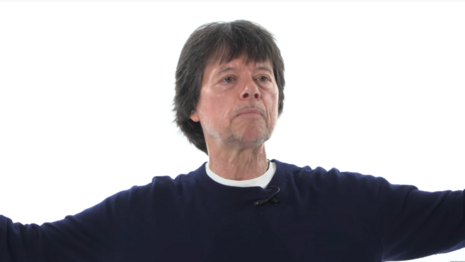Liberals love to insist they’re on the “right side of history,” and their confidence crests in the liberal dominance among academic historians. Just as the liberal media dominate our evaluation of day-to-day developments, liberals count on their historians to dominate our evaluation of the decades behind us.
 It’s not just historians, but our taxpayer-funded storytellers, like the insufferable PBS documentarian Ken Burns. On the day before Biden’s inauguration, NPR’s Morning Edition presented him like an American treasure with no partisan bias. So skip over his Ted Kennedy propaganda film for the 2008 Democratic convention, described by Politico as portraying him as “the modern Ulysses bringing his party home to port."
It’s not just historians, but our taxpayer-funded storytellers, like the insufferable PBS documentarian Ken Burns. On the day before Biden’s inauguration, NPR’s Morning Edition presented him like an American treasure with no partisan bias. So skip over his Ted Kennedy propaganda film for the 2008 Democratic convention, described by Politico as portraying him as “the modern Ulysses bringing his party home to port."
It’s pretty audacious to use steering metaphors for Teddy.
Don’t notice Burns just donated $2,800 this year to Alexandria Ocasio-Cortez, and the same amount to Sara Gideon, seeking to unseat Sen. Susan Collins, or his routine $5,000 donations to the Democratic Party of New Hampshire, where he resides.
Burns lauded the optimism of Franklin Roosevelt, and then took FDR’s inspirational mantle and spread it on Joe Biden. He has “been defined by loss and suffering, but [with] the positive power to say: What are you going to do? You can't curl up in a ball... So let's put one foot in front of the other and we'll see what we can do. This was part of FDR's essential greatness, and that optimism is at the heart of it. You can hear echoes of it in Joe Biden.”
On the same morning, The Washington Post put a historian roundup on the front page under the headline “Not only Trump will face the judgment of history: America’s commitment to democracy also to be scrutinized, scholars say.” Post reporter David Nakamura rounded up the usual liberal and leftist suspects for a partisan “scholar” roundup:
 1. Douglas Brinkley, a staff historian for CNN and the John Kerry campaign’s unofficial staff historian in 2004 with his G.I. Joe hagiography Tour of Duty. Brinkley ranks Trump near the bottom of presidents who “harmed the country.”
1. Douglas Brinkley, a staff historian for CNN and the John Kerry campaign’s unofficial staff historian in 2004 with his G.I. Joe hagiography Tour of Duty. Brinkley ranks Trump near the bottom of presidents who “harmed the country.”
2. Matthew Dallek, a “political historian at George Washington University,” who is political enough to suggest that all 74 million Trump voters cast doubt on the health of our democracy. Voting Republican proves our democracy is "incredibly fragile.” Democracy equals Democratic victory.
3. Joseph Crespino, a history professor at Emory University, who donated $500 in 2018 to liberal Sen. Sherrod Brown (D-Ohio), worried that documentation of Trump’s decision-making process may be difficult because “He’s not a reader or a note-taker or a memo writer.” Trump doesn’t read. That’s a little exaggerated, no? But it’s standard Washington Post analysis.
4. Nicole Hemmer, a “historian who specializes in conservative media and is working on the Obama Presidency Oral History [project] at Columbia University.” Hemmer’s a favorite of Brian Stelter on CNN. She says Trump and his movement show “we can understand that throughout American history there has been racism and fascism and anti-democratic forces and say he is drawing from those powerful influences.”
5. Ruth Ben-Ghiat, a “New York University historian who studies fascism,” repeats that Trump is “best understood in comparison to authoritarian-leaning figures abroad.”
6. Leah Wright Rigueur, "associate professor of American history at Brandeis University," says Trump’s been a case study in the “naked, unadulterated pursuit of power and self-interest, at the cost of 400,000 lives and at the cost of the American union.”
In short, the Post assembles history like the Democratic National Committee would. There is no dissent. There is only one view of history that is “factual,” and it lines up neatly, like a Ken Burns propaganda film for PBS.




